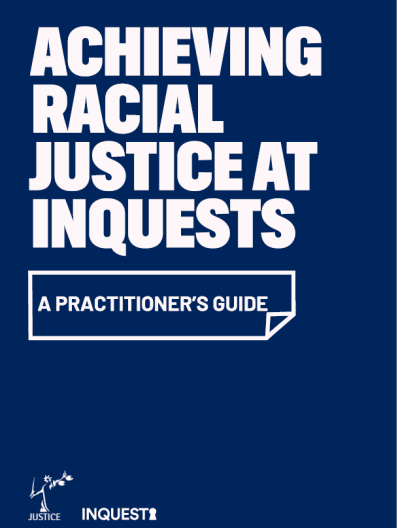A new guide published yesterday aims to to equip lawyers and coroners with the necessary information and tools to identify and investigate the role of racism in contributing to deaths in police custody, prisons, immigration detention, and mental health settings.
The joint guide has been developed by two human rights charities, JUSTICE and INQUEST, along with other stakeholders including legal experts, academics and bereaved families. In launching the guide, His Honour Judge Mark Lucraft KC, who acted as Chief Coroner of England & Wales between 2016-2020 said: ‘In some cases, securing truth and accountability will involve acknowledging the possible role of race or racism in a death.’
Whether racism was a factor leading to the death of a family member in detention is a common concern raised by Black and racialised families. However, inquests into deaths in custody typically neglect this question and may not even address the race of the deceased. This stops families from understanding the truth behind their loved-one’s death and further prevents the identification of potential life-saving issues to prevent this from happening again. The new guide hopes to address this to ensure the state is held accountable for racism in contributing to deaths in state custody.
Deborah Coles, the executive director of INQUEST explains, ‘The evidence of racial inequality in state institutions is glaring and undeniable. INQUEST’s casework shows the deaths of Black and racialised people are some of the most violent, contentious, and neglectful of all deaths in state custody.’
The guide discusses data obtained by JUSTICE in a freedom of information request in 2023, which indicated that, between 2012-13 to 2021-22, Black people were 6 times more likely to die than white people following the use of police force. It also references a previous publication by INQUEST which found that Black people were 7 times more likely to die than white people following police restraint in particular.
Professor Leslie Thomas KC, a leading expert on inquests and public inquiries supported the objectives of the guide and stated that: ‘Ensuring accountability and justice in cases of deaths in state custody is paramount. By ignoring or sidestepping this issue, they neglect to confront the systemic racism embedded in policies and practices that endanger lives.’
The guide gives a special role to lawyers and coroners to initiate changes in the current justice system. Fiona Rutherford, Chief Executive of JUSTICE said that, ‘Lawyers and coroners can change this; given the tools and confidence, they have a vital role to play in helping to uncover the truth, achieve racial justice, and save future lives.’
Concern about racial minority deaths in custody has been a long-standing issue. As reported in the Guardian in 2015, research published that year by the Institute of Race Relations found more than 500 Black, Asian and minority ethnic individuals had died in suspicious situations during state detention between 1991 and 2015 without any successful prosecutions of any officials.






